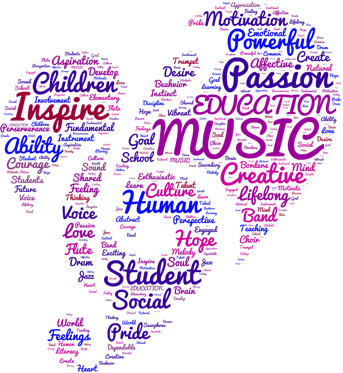Music can change the world
because it changes people.
~Bono


Music can change the world
because it changes people.
~Bono
As an educator, my job is to teach students and facilitate their learning. I am also a role model, mentor, listener, and disciplinarian; but first and foremost, I am an educator. There is a difference between teaching and facilitating, and both are a vital part of the overall education of the students. Students go to school not only to learn the content that is presented to them, but also to be prepared with the skill sets to tackle life upon graduating. This includes their ability to express knowledge already attained, but also dives further. While in school, students are developing abilities to analyze, critique, and synthesize new information as well as creating their own ideas. The main role as an educator then is not simply to teach students the content but to do so while facilitating their own growth as individuals capable of critical thought. Students come in to the classroom with some of this in a raw form we refer to as abilities. Through their time in the public schools, we help them to mold their talents and abilities into a fine product, capable of taking on the world. In order to build this independent growth, students have to be active in the classroom, helping to guide the lessons as much as the teacher. Education should be a team effort, not a dictatorship, with the educator being another piece of the puzzle. This is where the teacher becomes the facilitator, taking the students from where they are and providing opportunities for them to mature and prosper. In order to fulfill this philosophy, students should engage in discussion, design their own projects, make their own expectations, and critique themselves and their peers. By allowing students to have more involvement in their education, they will become more invested, therefore developing important life-long skills.

When designing an environment for this student growth, my foundation stands on agreements between the students and myself. Students are their own best influence and motivator; if they feel they are in control of the situation, they are more likely to invest the time and energy that would result in a high-quality finished product. My classroom will therefore be open to all students who are willing to be engaged in the act of learning. If they enjoy music, whether it is playing an instrument, listening to the radio, or singing in church, there is a place for music in their lives, and therefore a place for musical learning within the schools. Students should be offered many different types of learning opportunities to fit their interests and needs. Students who desire to feel that connection should be able to. In this way, I hope to go beyond the traditional sense to touch the lives of my students.
The foundation of a music classroom is not necessarily about reading music, writing a symphony, understanding theory, or being a proficient solo performer. To be a life-long musician is simply to have an understanding and appreciation of the art, whether it is an aural musician attending concerts, a sound mixer working with technology to manipulate sound, or a traditional performer. My goal is to develop musicians, first through their ears and hearts, then through their talents and abilities. These talents may occur in some students naturally, but can be equaled in others through dedicated effort and hard work. The overarching goal in education is to develop passionate, life-long learners. Through music, I hope to develop students who find a passion that they may share with others while becoming expressive, unique, and intelligent individuals.